Vitamin B12 is crucial to staying fit and healthy, but low levels can cause "damage" to the body.
According to the NHS, this damage can even be irreversible if people don't get enough of B12 in their diet.
Vitamin B12 is vital to maintain healthy energy levels and is one of the most important vitamins in maintaining the nervous system.
The nervous system has two main parts: the central nervous system, which is made up of the brain and spinal cord, and the peripheral nervous system, which is made up of nerves that branch off from the spinal cord and extend to all parts of the body.
A B12 deficiency can lead to peripheral neuropathy, which develops when nerves in the body's extremities such as the hands, feet and arms are damaged, reports MyLondon.

According to the NHS, the main symptoms of peripheral neuropathy in your feet include:
- Numbness
- Tingling
- Muscle weakness
"These symptoms are usually constant, but may come and go," explains the health body. It's important to see your GP if you're experiencing any of the above symptoms.
What causes B12 deficiency?
Pernicious anaemia is the most common cause of vitamin B12 deficiency in the UK. Pernicious anaemia is an autoimmune condition whereby your immune system attacks the cells in your stomach that produce the intrinsic factor, which means your body is unable to absorb vitamin B12.
However, some people can develop a vitamin B12 deficiency as a result of not getting enough vitamin B12 from their diet. The richest sources of B12 are animal-based so vegetarians and vegans are at a greater risk of B12 deficiency.
B12 is naturally found in:
- Meat and liver
- Fish
- Clams
- Milk and dairy products
- Eggs.
Plant-based sources of vitamin B12 include yeast extract (such as Marmite) fortified plant milks and fortified breakfast cereals.
How to treat at B12 Deficiency
"If you’re following a plant-based diet, taking a vitamin B12 supplement can help prevent a deficiency," says Holland and Barrett. "Breast-feeding mothers could also consider a supplement, as they need an extra 0.5mcg a day."
Don't miss the latest news from around Scotland and beyond - Sign up to our daily newsletter here.







